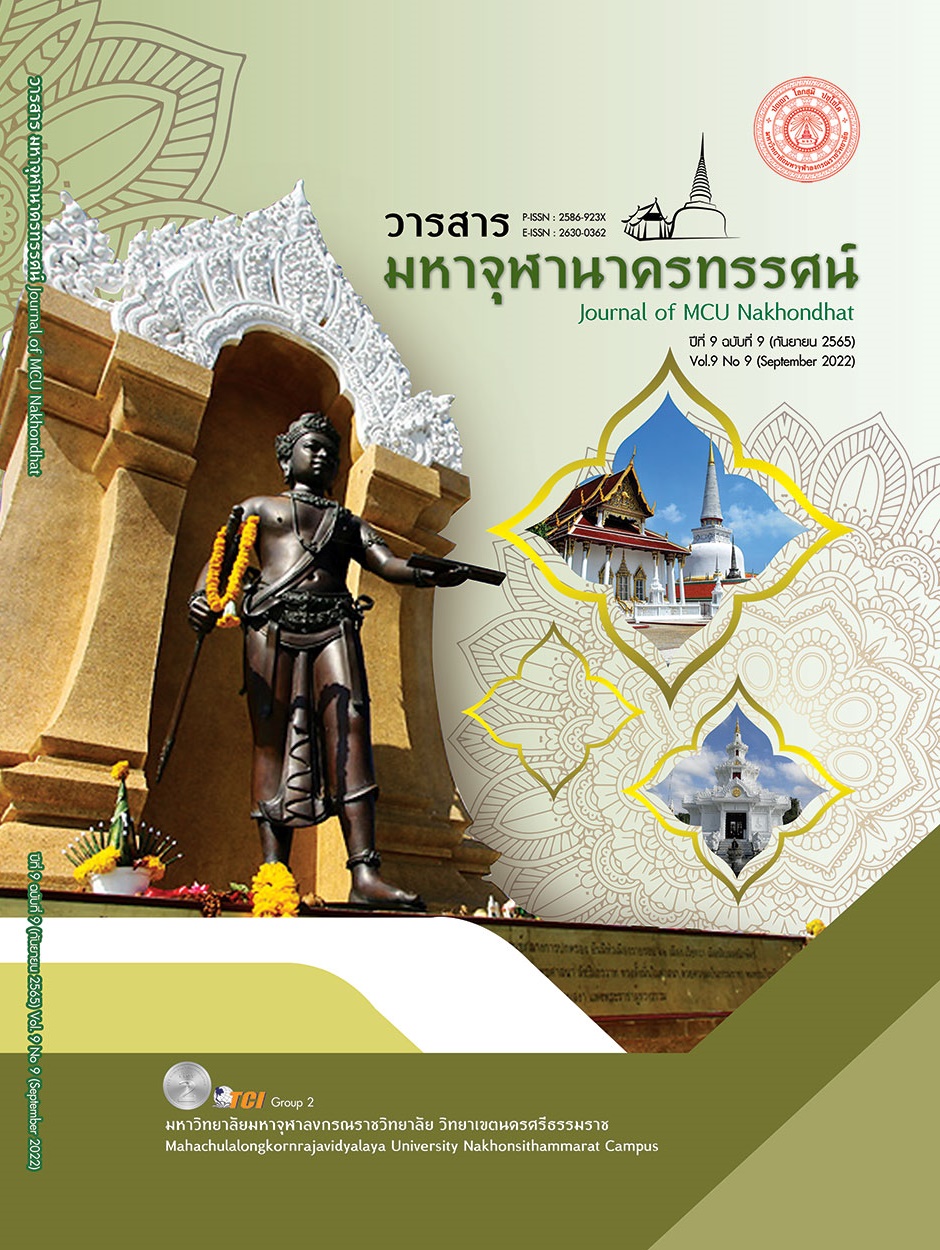[Retracted Article] DEVELOPMENT PROTOTYPE FOR YOUTH OF MORALITY AND ETHICS TRAINING OF SANGHA URATTHANI PROVINCE
Main Article Content
Abstract
The objectives of this research were 1) to study the general condition of model youth development. 2) To study the model youth development process morality and ethics; and 3) to present a model of youth development model. morality It is an integrated research method. There is a scope of content, including the content of training courses. in organizing training activities the use of teaching media in training Principles of 4M administration and trisikkha, morality, concentration, and wisdom. The sample group consisted of 283 youths who attended the Dharma practice in the Dharma Practice Office. The key information was the head of the Dharma Practice Office, Phra Wittayakorn, Director of the Office of Buddhism, totaling 18 figures/person. The tool used was a questionnaire/ interview The questionnaire reliability was 0.97. The data were analyzed by using basic statistics such as mean, standard deviation. morality The content of the training course Children and youth lack training to teach them knowledge. understanding of the principles In terms of organizing activities, it is the process of organizing activities suitable for the age of the trainees. Focus on children and youth Moral training activities aimed at developing physical, behavioral, mental, and intellectual use of teaching media in training. Teaching media is an intermediary between the teachers and the training participants. 2. The results of the analysis of the model youth development process. morality Overall, the overall level was at a high level, in descending order, namely, training activities. The content of the training course and the use of teaching media in training. 3. To present a model of youth development model Moral and ethical aspects are filial piety. happy with principles Prayer activity There are training materials made from computer programs, still images.
Article Details

This work is licensed under a Creative Commons Attribution-NonCommercial-NoDerivatives 4.0 International License.
References
กระทรวงศึกษาธิการ. (2544). คู่มือการจัดกระบวนการเรียนรู้หน้าที่พลเมืองศีลธรรมระดับประถมศึกษา. กรุงเทพมหานคร: โรงพิมพ์คุรุสภาลาดพร้าว.
เชวง เตชะโกศยะ. (2563). การปลูกฝังคุณธรรม จริยธรรมแก่นักศึกษา. เรียกใช้เมื่อ 8 กรกฎาคม 2563 จาก http: // www. jariyatam.com/th/moral-cultivation
ดวงเดือน พันธุมนาวิน. (2544 ข). การพัฒนาจริยธรรม. กรุงเทพมหานคร: สถาบันวิจัยพฤติกรรมศาสตร์ มหาวิทยาลัยศรีนครินทรวิโรฒประสานมิตร.
พระครูนิวิฐวิริยคุณ (โปธาวิชัย). (2550). การพัฒนาคุณธรรมจริยธรรมนักเรียนของโรงเรียนการกุศลของวัดในพระพุทธศาสนา จังหวัดลำพูน. ใน วิทยานิพนธ์มหาบัณฑิต สาขาวิชาการบริหารการศึกษา. มหาวิทยาลัยราชภัฏลำปาง.
พระครูสมุห์บุญเลิศ ชยวฺโส (ชัยวงษ์). (2552). สภาพการจัดการเรียนการสอนของพระสอนศีลธรรมในโรงเรียน สังกัดสำนักงานเขตพื้นที่การศึกษาเชียงใหม่ เขต 1. ใน วิทยานิพนธ์พุทธศาสตรมหาบัณฑิตสาขาวิชาการจัดการเชิงพุทธ. มหาวิทยาลัยมหาจุฬาลงกรณราชวิทยาลัย.
พระประกาศิต ปญญาธโร (ยามประโคน). (2552). บทบาทของครูผู้สอนวิชาพระพุทธศาสนาในการส่งเสริมจริยธรรมของนักเรียนโรงเรียนวัดบ้านสะแกซำ ตำบลสะแกซำ อำเภอเมือง จังหวัดบุรีรัมย์. ใน วิทยานิพนธ์พุทธศาสตรมหาบัณฑิต สาขาวิชาการจัดการเชิงพุทธ. มหาวิทยาลัยมหาจุฬาลงกรณราชวิทยาลัย.
พระอดิศร ฐานวุฑฺโฒ (กลุ่มประสิทธิ์). (2552). ศึกษาการฝึกอบรมคุณธรรมจริยธรรม: ศึกษากรณีค่ายธรรม ทายาทของฝ่ายบริการฝึกอบรม ส่วนธรรมนิเทศ มหาวิทยาลัยมหาจุฬาลงกรณราชวิทยาลัย. ใน วิทยานิพนธ์พุทธศาสตรมหาบัณฑิต สาขาการจัดการเชิงพุทธ. มหาวิทยาลัยมหาจุฬาลง กรณราชวิทยาลัย.
สำนักงานคณะกรรมการการพัฒนาการเศรษฐกิจและสังคมแห่งชาติ. (2550). แผนพัฒนาเศรษฐกิจและสังคมแห่งชาติ ฉบับที่ 10 พ.ศ. 2550 – 2554. กรุงเทพมหานคร: สำนักงานคณะกรรมการการ พัฒนาการเศรษฐกิจและสังคมแห่งชาติ.
สำนักงานรับรองมาตรฐานและประเมินคุณภาพการศึกษา. (2550). มาตรฐานตัวบ่งชี้และเกณฑ์ พิจารณาเพื่อการประเมินคุณภาพภายนอกระดับการศึกษาขั้นพื้นฐาน. กรุงเทพมหานคร: บริษัท จุดทอง จำกัด.


